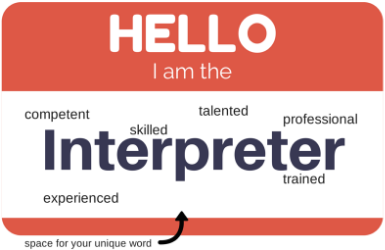You are 10 minutes into your shift as a staff interpreter at your hospital when you get a call from your manager to report to the Emergency Room. 57-year-old female patient, abdominal pain. Shouldn’t be too bad, considering the types of cases that typically turn up at the ER.
You enter the exam room with the Emergency Room physician. The patient takes one look at the ER doctor and says, “Send in a real doctor. Preferably someone who has been out of high school for more than a week.”
Oh, this is going to be rough, you think to yourself while inhaling deeply before beginning the interpretation.
Then, without so much as a hesitation, the patient looks straight at you and says, “And you! You don’t even know how to speak [insert language]. Call my daughter, and tell her to come interpret for me!”
It was a strange thing to hear since you had never met this woman before, much less interpreted for her. How could she possibly have assessed your competence as an interpreter when all you’ve had the opportunity to do so far is inhale?
Not all encounters are as spicy as this one, but medical interpreters are frequently sized up by patients, family members, and other medical team colleagues. (Can we blame them? Wouldn’t you do the same in their situation?)
There is a variety of reasons why a person might pre-determine the interpreter’s competence (or lack thereof). The interpreter is
- too young
- too old
- too American
- not American enough
- not the right skin color
- not the right hair length
- not the right gender
- wears glasses
- has a hearing aid
- etcetera
Please don’t get me wrong. I’m not saying I agree with any of those “reasons” – although “too young” would be spot-on in the case of a minor, but that’s a different story for a different day.
The point is that the interpreter, through no fault of his or her own, might be faced with some real, albeit unfounded, barriers to inspiring confidence among others.
One option is to ignore this. Not advisable. Another option is to head it off right from the very beginning. The pre-session is a good time to do this.
Ah, yes. The pre-session. That magical time when the heroic interpreter informs all parties of the role and responsibilities of said interpreter (in a nutshell) before transitioning to the interpreted communication. It’s a perfect opportunity to inspire confidence in the interpreter’s abilities (a.k.a. competence) as well.
To the exceedingly humble interpreters who wouldn’t dream of elevating themselves in the eyes of others (Isn’t that all of us?): Doing this is not bragging; it is speaking the truth. It is not arrogant; it is putting others at ease. I’m glad we’ve established this. Now, let’s move on to the particulars.
When introducing yourself, make a brief mention of why you are particularly qualified to interpret. Perhaps you could mention that you
- specialize in medical interpreting,
- have earned national certification,
- have completed comprehensive training specific for medical interpreting,
- have completed advanced interpreter training,
- have been interpreting for X number of years,
- or any other thing that conveys that you are an exceptionally qualified interpreter.
No need to rattle off your curriculum vitae. Just a word or phrase to humbly express your professional awesomeness and put others at ease will suffice.
Hopefully, you won’t have too many encounters with individuals who overtly accuse you of being unqualified, when clearly you are qualified. Regardless, be proactive, and give others peace of mind so they can concentrate on the medical appointment and not be distracted with worries about their interpreter’s abilities.
After all, it’s not enough that you know that you’re an awesome interpreter capable of handling the many linguistic and ethical curveballs that will inevitably fly your way. The other parties involved need to know this as well.
Which reminds me of a little joke:
Mrs. Anderson to the surgeon: Doctor, I’m terribly nervous. This is my first surgery.
Surgeon to Mrs. Anderson: I understand exactly how you feel, Mrs. Anderson. This is my first surgery, too.

